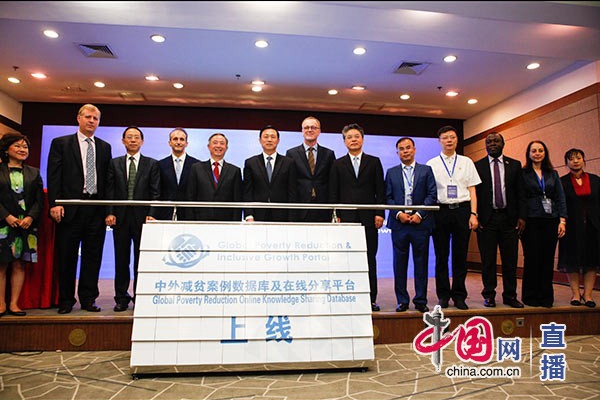|

|
|
Officials and representatives launch The Global Poverty Reduction Online Knowledge Sharing Database in Beijing, May 26, 2017. [Photo/China.org.cn]
|
A new database portal of poverty reduction cases was launched in Beijing on Friday, aiming to share innovative and successful approaches and solutions from China and other developing countries and contribute to the global fight to end poverty.
The Global Poverty Reduction Online Knowledge Sharing Database (http://case.iprcc.org.cn/) serves as a portal for South-South knowledge sharing. It presents cases in a user-friendly way, while also allowing users to upload their own cases, thereby creating a truly global poverty reduction database.
It was launched on Friday at the 2017 China Poverty Reduction International Forum held in Beijing, attended by officials and representatives from international organizations, embassies as well as businesses.
Guo Weimin, the vice minister of the State Council Information Office (SCIO), said China’s experiences in poverty reduction were intellectual treasures that could be shared with the world, adding, “There are still more than 800 million people living in extreme poverty in the world today. Poverty reduction requires a global strategy. We should work together to realize zero poverty by 2030.”
The forum could be a new starting point for in-depth communication and exploration to reach consensus and assemble the global will and power to establish a new pattern for poverty reduction.
Chen Zhigang, the deputy director of the State Council Leading Group Office of Poverty Alleviation and Development, said China’s experiences on poverty reduction was playing a very important role in the world that could not be ignored.
Launched by the Global Poverty Reduction & Inclusive Growth (GPIG) Portal and managed by the China Internet Information Center (CIIC) and the International Poverty Reduction Center in China (IPRCC), the database portal draws great benefit from a strong network of contributors.
While the IPRCC takes a lead on the Chinese side by leveraging its own resources and partnering with universities and research institutes, many international organizations also play their part. With main contributions from the World Bank, the portal has also developed partnerships with the Asian Development Bank (ADB) and the Food and Agriculture Organization of the United Nations (FAO) as well as more than 40 global think tanks and research institutions to contribute to the case database. The public are also encouraged to upload cases that could be valuable.
Bert Hofman, World Bank country director for China, Mongolia and Korea said, “China has achieved phenomenal success in reducing poverty, lifting hundreds of millions of people out of poverty between 1981 and 2015, the fastest rate of poverty reduction ever recorded. China’s experience in poverty reduction can offer useful lessons to other developing countries.”
Bekele Debela, the program leader of World Bank said, “This is a very resourceful platform. And its resourcefulness is also because it is based in China that has abundant experience in poverty reduction, it will serve both China and the rest of the world.”
Meanwhile, Vincent Martin, FAO Representative in China and DPR Korea, declared, “Invaluable poverty reduction policies and know-how generated in China and elsewhere should be made available to the international community to help achieve Sustainable Development Goals (SDGs). In that regard, the launch of the online case database is a key step forward, and innovation should be embedded in the sharing of policies and best practices.”
“China’s experience clearly contains lessons for alleviating poverty that other developing country can learn from,” said Benedict Bingham, the country director of PRC Resident Mission, ADB. “I am therefore delighted that IPRCC is launching a platform, which ADB has helped initiate, to share poverty reduction experience in China and other countries.”
“It is important to learn about what has worked well in reducing poverty, beyond ensuring stable macroeconomic environment and pursuing broad structural transformation agendas. Poverty reduction requires well-targeted strategies to tackle the needs of the most vulnerable,” he said.
Shozab Abbas, the political counsellor of Pakistan Embassy to China, told China.org.cn he believed it was a very important platform, with China being the leading country in alleviating poverty, so Pakistan would like to listen to and learn from China, while the two countries could collaborate with programs in this area in the future.
The online case database was launched at the 2017 China Poverty Reduction International Forum held in Beijing, aiming to share experience and discuss practical solutions to poverty.
The event was jointly organized by the China Internet Information Center (CIIC), the International Poverty Reduction Center in China (IPRCC), the World Bank, FAO and ADB.
